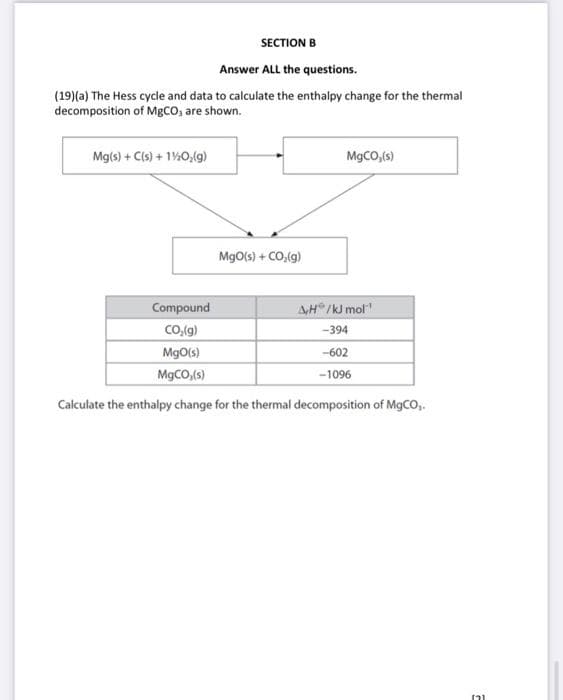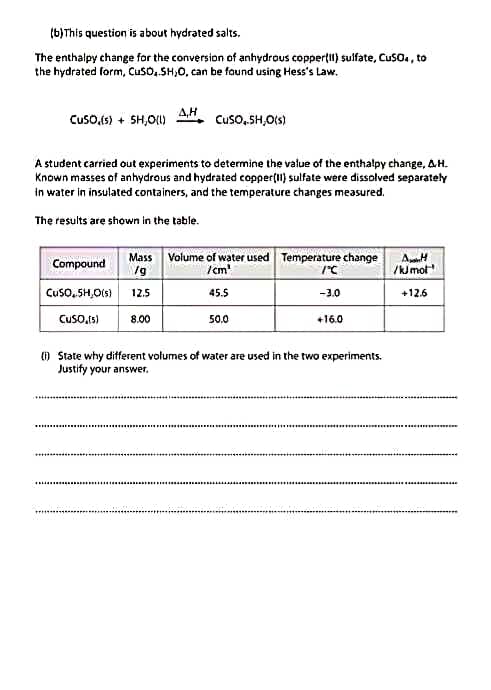SECTION B Answer ALL the questions. (19)(a) The Hess cycle and data to calculate the enthalpy change for the thermal decomposition of MBCO, are shown. Mg(s) + CIs) + 1%0,(g) MgCO,(s) Mgo(s) + CO,(g) Compound AH /kJ mol Co.(g) -394 MgO(s) -602 M9CO,(s) -1096 Calculate the enthalpy change for the thermal decomposition of MgCO,.
SECTION B Answer ALL the questions. (19)(a) The Hess cycle and data to calculate the enthalpy change for the thermal decomposition of MBCO, are shown. Mg(s) + CIs) + 1%0,(g) MgCO,(s) Mgo(s) + CO,(g) Compound AH /kJ mol Co.(g) -394 MgO(s) -602 M9CO,(s) -1096 Calculate the enthalpy change for the thermal decomposition of MgCO,.
Chemistry
10th Edition
ISBN:9781305957404
Author:Steven S. Zumdahl, Susan A. Zumdahl, Donald J. DeCoste
Publisher:Steven S. Zumdahl, Susan A. Zumdahl, Donald J. DeCoste
Chapter1: Chemical Foundations
Section: Chapter Questions
Problem 1RQ: Define and explain the differences between the following terms. a. law and theory b. theory and...
Related questions
Question
6

Transcribed Image Text:SECTION B
Answer ALL the questions.
(19)(a) The Hess cycle and data to calculate the enthalpy change for the thermal
decomposition of MBCO, are shown.
Mg(s) + C(s) + 1%0,(g)
MgCO,(s)
MgO(s) + CO,(g)
Compound
AH /kJ mol
Co.(g)
-394
MgO(s)
-602
MGCO,(s)
-1096
Calculate the enthalpy change for the thermal decomposition of MGCO,.

Transcribed Image Text:(b)This question is about hydrated salts.
The enthalpy change for the conversion of anhydrous coppertil) sulfate, Cuso., to
the hydrated form, Cuso, SH,0, can be found using Hess's Law.
Cuso,(s) + SH,O)
AH
Cuso, SH,Ots)
A student carried out experiments to determine the value of the enthalpy change, AH.
Known masses of anhydrous and hydrated copper() sulfate were dissolved separately
in water in insulated containers, and the temperature changes measured.
The results are shown in the table.
Mass Volume of water used Temperature change
/cm
Compound
/kimot
Cuso, SH,O1s) 12.5
45.5
-3.0
+12.6
Cuso,s)
8.00
50.0
+16.0
) State why different volumes of water are used in the two experiments.
Justify your answer.
Expert Solution
This question has been solved!
Explore an expertly crafted, step-by-step solution for a thorough understanding of key concepts.
Step by step
Solved in 2 steps

Knowledge Booster
Learn more about
Need a deep-dive on the concept behind this application? Look no further. Learn more about this topic, chemistry and related others by exploring similar questions and additional content below.Recommended textbooks for you

Chemistry
Chemistry
ISBN:
9781305957404
Author:
Steven S. Zumdahl, Susan A. Zumdahl, Donald J. DeCoste
Publisher:
Cengage Learning

Chemistry
Chemistry
ISBN:
9781259911156
Author:
Raymond Chang Dr., Jason Overby Professor
Publisher:
McGraw-Hill Education

Principles of Instrumental Analysis
Chemistry
ISBN:
9781305577213
Author:
Douglas A. Skoog, F. James Holler, Stanley R. Crouch
Publisher:
Cengage Learning

Chemistry
Chemistry
ISBN:
9781305957404
Author:
Steven S. Zumdahl, Susan A. Zumdahl, Donald J. DeCoste
Publisher:
Cengage Learning

Chemistry
Chemistry
ISBN:
9781259911156
Author:
Raymond Chang Dr., Jason Overby Professor
Publisher:
McGraw-Hill Education

Principles of Instrumental Analysis
Chemistry
ISBN:
9781305577213
Author:
Douglas A. Skoog, F. James Holler, Stanley R. Crouch
Publisher:
Cengage Learning

Organic Chemistry
Chemistry
ISBN:
9780078021558
Author:
Janice Gorzynski Smith Dr.
Publisher:
McGraw-Hill Education

Chemistry: Principles and Reactions
Chemistry
ISBN:
9781305079373
Author:
William L. Masterton, Cecile N. Hurley
Publisher:
Cengage Learning

Elementary Principles of Chemical Processes, Bind…
Chemistry
ISBN:
9781118431221
Author:
Richard M. Felder, Ronald W. Rousseau, Lisa G. Bullard
Publisher:
WILEY